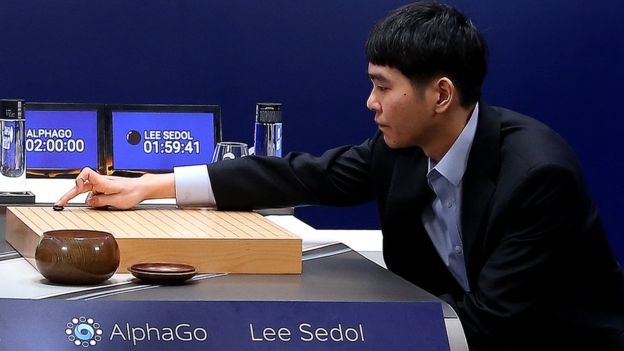In a landmark battle between man and artificial intelligence (AI), the world champion of the game Go was narrowly defeated by his computer opponent.
Google’s DeepMind AlphaGo program beat South Korea’s Lee Se-dol in the first of a series of games in Seoul.
In October 2015, AlphaGo beat the European Go champion, an achievement that was not expected for years.
A computer has beaten the world chess champion, but the Chinese game Go is seen as significantly more complex.
Throughout most of the game he had seemed to have the upper hand but in the last 20 minutes, AlphaGo took an unassailable lead. Mr Lee then forfeited, handing victory to his opponent.
“I was very surprised because I did not think that I would lose the game,” said Mr Lee.
“A mistake I made at the very beginning lasted until the very last.”
The Go player has won 18 world championships since turning professional at the age of 12.
He said AlphaGo’s early strategy was “excellent” and that he was stunned by one unconventional move it had made that a human never would have played.
Despite his initial loss though, he did not regret accepting the challenge.
“I had a lot of fun playing Go and I’m looking forward to the future games,” he said.
The two sides will play a total of five games over the coming days for a prize of about $1m (£700,000).
The five-day battle is being seen as a major test of what scientists and engineers have achieved in the sphere of artificial intelligence.
Go is a 3,000-year old Chinese board game and is considered to be a lot more complex than chess where artificial intelligence scored its most famous victory to date when IBM’s Deep Blue beat grandmaster Gary Kasparov in 1997.
But experts say Go presents an entirely different challenge because of the game’s incomputable number of move options which means that the computer must be capable of human-like “intuition” to prevail.
“Playing against a machine is very different from an actual human opponent,” Mr Lee revealed ahead of the match.
“Normally, you can sense your opponent’s breathing, their energy. And lots of times you make decisions which are dependent on the physical reactions of the person you’re playing against.
“With a machine, you can’t do that.”



Leave a Reply